出版物
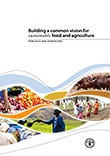
Sustainability is at the heart of FAO's new Strategic Framework and is the specific focus of Strategic Objective 2, which aims at sustainably increasing the provision of goods and services from agriculture, forestry and fisheries. This report is the outcome of intensive consultations and discussions aimed at developing a common approach to FAO's work on sustainability. That process was conducted in a climate of cross-sectoral collaboration that drew on the contributions of leading FAO and external specialists in crops, livestock, forestry, capture fisheries, aquaculture and natural resources. The report provides the vision, the key principles and indications on the way forward to transition towards sustainable food and agriculture. It builds on the Organization's long experience in developing sustainability concepts, approaches and tools, and offers a common platform for a vision of the agriculture sector and of the inter-sectoral synergies that will eventually make agriculture more productive and sustainable.
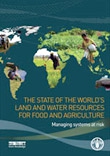
This edition of The State of the World’s Land and Water Resources for Food and Agriculture (SOLAW) fills an important thematic gap in FAO's flagship publication series, and presents objective and comprehensive information and analyses on the current state, trends and challenges facing two of the most important agricultural production factors: land and water.
Land and water resources are central to agriculture and rural development, and are intrinsically linked to global challenges of food insecurity and poverty, climate change adaptation and mitigation, as well as degradation and depletion of natural resources that affect the livelihoods of millions of rural people across the world.
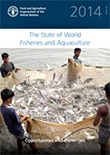
In a world where more than 800 million continue to suffer from chronic malnourishment and where the global population is expected to grow by another 2 billion to reach 9.6 billion people by 2050 - with a concentration in coastal urban areas - we must meet the huge challenge of feeding our planet while safeguarding its natural resources for future generations. This new edition of The State of World Fisheries and Aquaculture (SOFIA) highlights the significant role that fisheries and aquaculture plays in eliminating hunger, promoting health and reducing poverty. Never before have people consumed so much fish or depended so greatly on the sector for their well-being. Fish is extremely nutritious - a vital source of protein and essential nutrients, especially for many poorer members of our global community. Fisheries and aquaculture is a source not just of health but also of wealth. Employment in the sector has grown faster than the world's population. The sector provides jobs to tens of millions and supports the livelihoods of hundreds of millions. Fish continues to be one of the most-traded food commodities worldwide. It is especially important for developing countries, sometimes worth half the total value of their traded commodities.
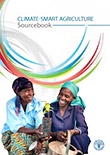
Between now and 2050, the world's population will increase by one-third. Most of these additional 2 billion people will live in developing countries. At the same time, more people will be living in cities. If current income and consumption growth trends continue, FAO estimates that agricultural production will have to increase by 60 percent by 2050 to satisfy the expected demands for food and feed. Agriculture must therefore transform itself if it is to feed a growing global population and provide the basis for economic growth and poverty reduction. Climate change will make this task more difficult under a business-as-usual scenario, due to adverse impacts on agriculture, requiring spiralling adaptation and related costs.
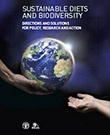
This book presents the current state of thought on the common path of sustainable diets and biodiversity and addresses the linkages among agriculture, health, the environment and food industries.
The alarming pace of biodiversity loss and ecosystem degradation and their negative impact on poverty and health makes a compelling case for re-examining food systems and diets. Thus, there is an urgent need to develop and promote strategies for sustainable diets, emphasizing the positive role of food biodiversity in human nutrition and poverty alleviation.
Sustainable Diets are those diets with low environmental impacts which contribute to food and nutrition security and to healthy life for present and future generations. Sustainable diets are protective and respectful of biodiversity and ecosystems, culturally acceptable, accessible, economically fair and affordable; nutritionally adequate, safe and healthy; while optimizing natural and human resources.
The contents of this book represent the presentations given at the International Scientific Symposium on Biodiversity and Sustainable Diets, organized by FAO and Bioversity International and held at FAO, Rome, from 3 to 5 November 2010.

